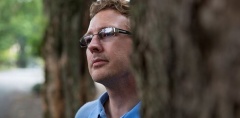Fritz Schoon
 | |
| Born | 6 February 1982 |
| Alma mater | • University of Witwatersrand • University of KwaZulu-Natal • University of Cape Town |
Son of anti-apartheid activist Marius Schoon | |
Fritz Schoon is a former PhD student in Sociology at the University of Cape Town, where his research was on South African industrial policy, and the extent to which South Africa’s polices adhere with those that one would anticipate to be implemented in a “Developmental State.” He compared policies adopted and institutions forged in South Africa, Brazil, and Malaysia.
Schoon also holds a Master’s degree in Development Studies from the School of Development Studies, University of KwaZulu-Natal, and holds bachelor’s degrees in Development Studies and Law & Political Studies, from the University of Witwatersrand.[1]
Witness to murder
Fritz Schoon is son of anti-apartheid activist Marius Schoon who, when working in exile at Lubango in Angola, was targeted by South Africa's superspy Craig Williamson with a parcel bomb on 28 June 1984. Two-year-old Fritz's father was not at home when the bomb exploded but his mother Jeannette and sister Katryn were killed. Fritz survived and was found wandering around the house. He never fully recovered from the trauma of seeing his mother and sister murdered before his eyes and developed epilepsy as a direct consequence.[2]
Refuge in Ireland
After the bombing, Marius and Fritz moved several times, first to Tanzania, then Zambia and eventually to Ireland. In 1986, Marius Schoon married Sherry Mclean, an Irish woman who had met Marius while volunteering in Tanzania in a school established by the ANC. The Schoon family returned to South Africa in 1991 after the ban on anti-apartheid parties was lifted.[3]
Williamson fails to pay up
In April 2008, a South African court ordered Williamson to pay exemplary damages for the trauma caused to Fritz.[4] Williamson, however, who was a silent partner in Cigarettes Tobacco Cigars Pty Ltd, trading as Carnilinx,[5] had hidden all of his assets.[6] And although court orders were made to sequestrate him, Fritz Schoon reported that none of his assets were in fact sold, and he was declared insolvent in South Africa.[7]